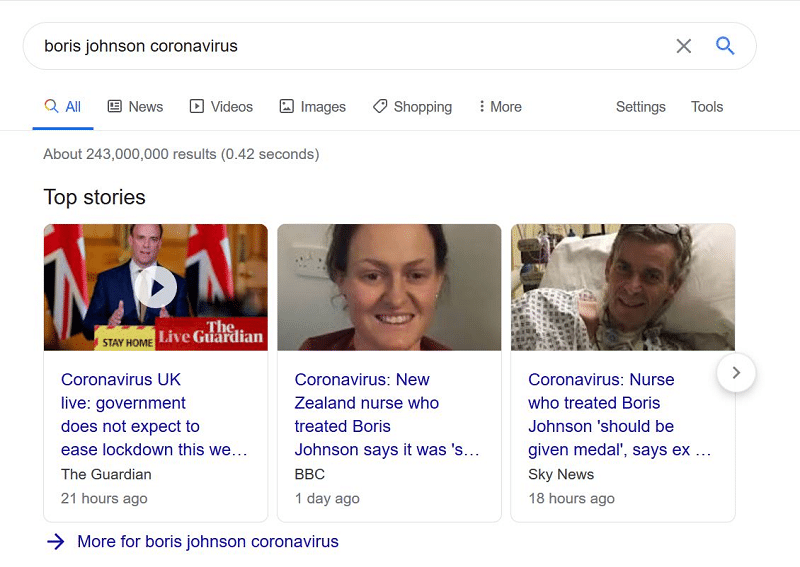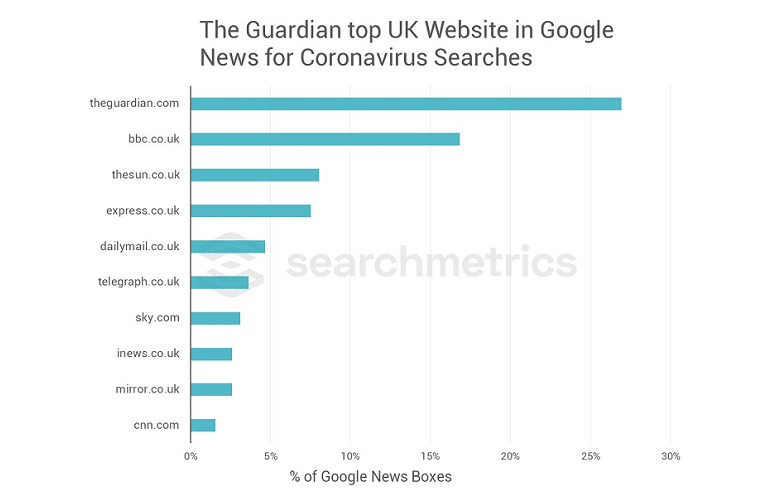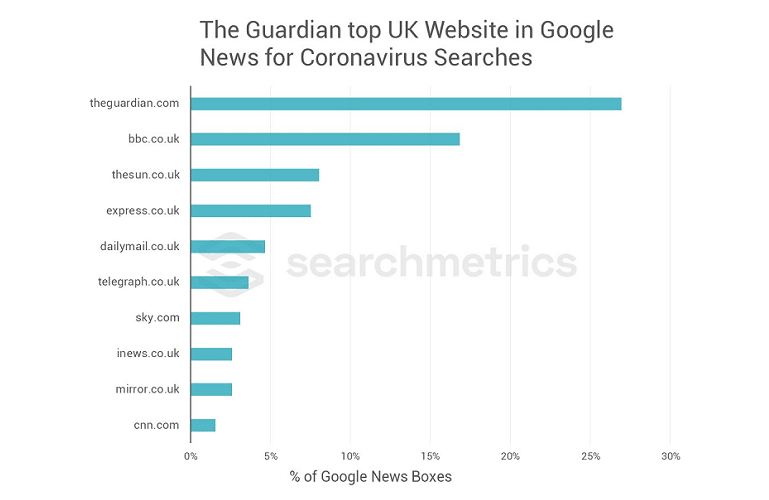
The research, from Searchmetrics, indicates that the UK news website appears more frequently on page one of Google UK for virus-related searches than World Health Organisation and other official or government information sources the research finds.
The Telegraph and BBC websites also appear in 6th and 7th places in the list of sites with most page one appearances.
The Guardian tops Google UK rankings for searches about coronavirus:
1. Theguardian.com (6.1%)
2. who.int (4.8%)
3. cdc.gov (4.5%)
4. en.wikipedia.org (4.5%)
5. nhs.uk (3.8%)
6. telegraph.co.uk (3.4%)
7. bbc.co.uk (3.1%)
8. ncbu.nlm.nih.gov (2.9%)
9. gov.uk (2.8%)
10. ecdc.europa.eu (2.4%)
“Google is of course many people’s go-to website when they want to find out the latest information about the virus,” explains Stephen Bench-Capon, Senior Content Marketing Manager, at search and content optimisation platform, Searchmetrics. “The fact that the Guardian, Telegraph and BBC rank alongside official information sources in terms of Google visibility is a credit to the trust the search engine has in these news sites. The Guardian even makes it into the top ten sources of virus-related information in the US.”
“The virus is the ultimate ‘Your Money or Your Life’ search topic, a category of search to which Google pays extra special attention – since showing poor quality information could have a significant impact on a searcher’s current or future well-being. For this sort of topic Google instructs quality raters in its guidelines to focus on sites that display a high level of expertise, authority and trust (E-A-T).”

The Guardian, BBC and The Sun websites also take first, second and third spots in the list of top 10 media sites that Google is most likely to include in its sought-after ‘Top stories’ boxes (also known as Google News boxes)* when people search for coronavirus on Google UK.
The Google news boxes, which include headlines, images and links to the featured news stories, appear in the prime location at the top of Google’s first page and above the traditional search results. They are a highly visible way for media sites to gain traffic from Google searches on hot topics. And they are being displayed by Google for around of half of all searches related to the virus according to Searchmetrics.
The Guardian has its articles appearing in 26.9% of news boxes that appear for virus related searches, followed by The BBC (16.8%) and The Sun (8%).
Appearances in Google News Boxes for Coronavirus Topics – UK (top 10 news sources)
1. theguardian.com (26.9%)
2. bbc.co.uk (16.8%)
3. thesun.co.uk (8%)
4. express.co.uk (7.5%)
5. dailymail.co.uk (4.7%)
6. telegraph.co.uk (3.6%)
7. sky.com (3.1%)
8. inews.co.uk (2.6%)
9. mirror.co.uk (2.6%)
10. cnn.com (1.6%)

“While news publishers’ ad revenue is down because of the economic impact of the crisis and because some brands don’t want to want to advertise next to virus related stories, the hope for those publishers that are winning more traffic right now through Google is that they can turn those additional visitors into regular longer term readers which can help them to bring in more advertising once the crisis is over,” explains Bench-Capon.

The Searchmetrics study was based on analysis of Google UK search results for 500 coronavirus related keywords. It included keywords covering,
• General virus information (Informational searches for pandemic data, symptoms of COVID-19, treatments etc).
• Economic issues (for people looking for updates regarding unemployment benefits, state support for freelancers etc).
• Non-Pharmaceutical Interventions (information on social-distancing guidelines, school closures etc).
• Personal protection and prevention (for people looking for guides to hand washing, making face masks etc).
The data was collected on April 3rd, 2020.
For more information about the study and additional findings visit the Searchmetrics blog post here.
